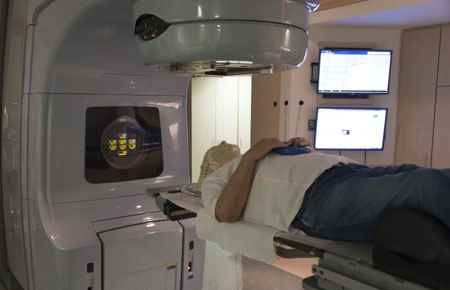
Radiation Therapist
Summary
Radiation therapists treat diseases in patients by administering radiation treatments.
What they do
Radiation therapists typically do the following:
- Explain treatment plans to the patient and answer questions about treatment
- Protect the patients and themselves from improper exposure to radiation
- Determine the exact location of the area requiring treatment
- Calibrate and operate the machine to treat the patient with radiation
- Monitor the patient to check for unusual reactions to the treatment
- Keep detailed records of treatment
Radiation therapists operate machines, such as linear accelerators, to deliver concentrated radiation therapy to the region of a patient’s tumor. Radiation treatment can shrink or remove cancers and tumors.
Radiation therapists are part of the oncology teams that treat patients with cancer. They often work with the following specialists:
- Radiation oncologists are physicians who specialize in radiation therapy
- Oncology nurses specialize in caring for patients with cancer
- Medical physicists help in planning of radiation treatments, develop better and safer radiation therapies, and check that radiation output is accurate
Work Environment
Radiation therapists are on their feet for long periods and may need to lift or turn disabled patients. Because they work with radiation and radioactive material, radiation therapists must follow safety procedures to make sure that they are not exposed to a potentially harmful amount of radiation. These procedures usually require therapists to stand in a different room while the patient undergoes radiation procedures.
Since radiation therapists administer radiation treatments over many years they should take precautions to limit exposure and be aware of the risks involved.
How to become a Radiation Therapist
Most radiation therapists complete programs that lead to an associate degree or bachelor’s degree in radiation therapy. Radiation therapists must be licensed or certified in most states. Requirements vary by state, but often include passing a national certification exam.
Employers usually prefer to hire applicants who have an associate degree or a bachelor’s degree in radiation therapy. However, candidates may qualify for some positions by completing a certificate program.
Radiation therapy programs include courses in radiation therapy procedures and the scientific theories behind them. These programs often include experience in a clinical setting and courses in human anatomy and physiology, physics, algebra, computer science, and research methodology. In 2016, there were about 110 accredited educational programs recognized by the American Registry of Radiologic Technologists (ARRT).
Pay
The median annual wage for radiation therapists was $85,560 in May 2019. The median wage is the wage at which half the workers in an occupation earned more than that amount and half earned less. The lowest 10 percent earned less than $59,280, and the highest 10 percent earned more than $128,630.
Job Outlook
Employment of radiation therapists is projected to grow 7 percent from 2019 to 2029, faster than the average for all occupations.
The incidence of cancer increases as people age, so an aging population may increase demand for radiation therapists. Continued advancements in the detection of cancer and the development of more sophisticated treatment techniques may also lead to greater demand for radiation therapy.
Similar Job Titles
Chief Radiation Therapist (Chief RT), Computed Tomography Simulation Therapist (CT Simulation Therapist), Dosimetrist, Lead Radiation Therapist, Medical Dosimetrist, Radiation Therapist, Radiation Therapy Technologist (RTT), Registered Radiation Therapist, Senior Radiation Therapist, Staff Radiation Therapist
Related Occupations
Respiratory Therapist, Cardiovascular Technologist and Technician, Diagnostic Medical Sonographer, Respiratory Therapy Technician, Radiologic Technician
More Information
The trade associations listed below represent organizations made up of people (members) who work and promote advancement in the field. Members are very interested in telling others about their work and about careers in those areas. As well, trade associations provide opportunities for organizational networking and learning more about the field’s trends and directions.
- American Society for Radiation Oncology - The core purpose of this organization is to advance the field of radiation oncology.
- American Society of Radiologic Technologists - The mission of the American Society of Radiologic Technologists is to advance and elevate the medical imaging and radiation therapy profession and to enhance the quality and safety of patient care.
Magazines and Publications
- Journal of Clinical Oncology
- Radiology Today Magazine
- Practical Radiation Oncology
- Advances in Radiation Oncology
Content retrieved from: US Bureau of Labor Statistics-OOH www.bls.gov/ooh,
CareerOneStop www.careeronestop.org, O*Net Online www.onetonline.org
